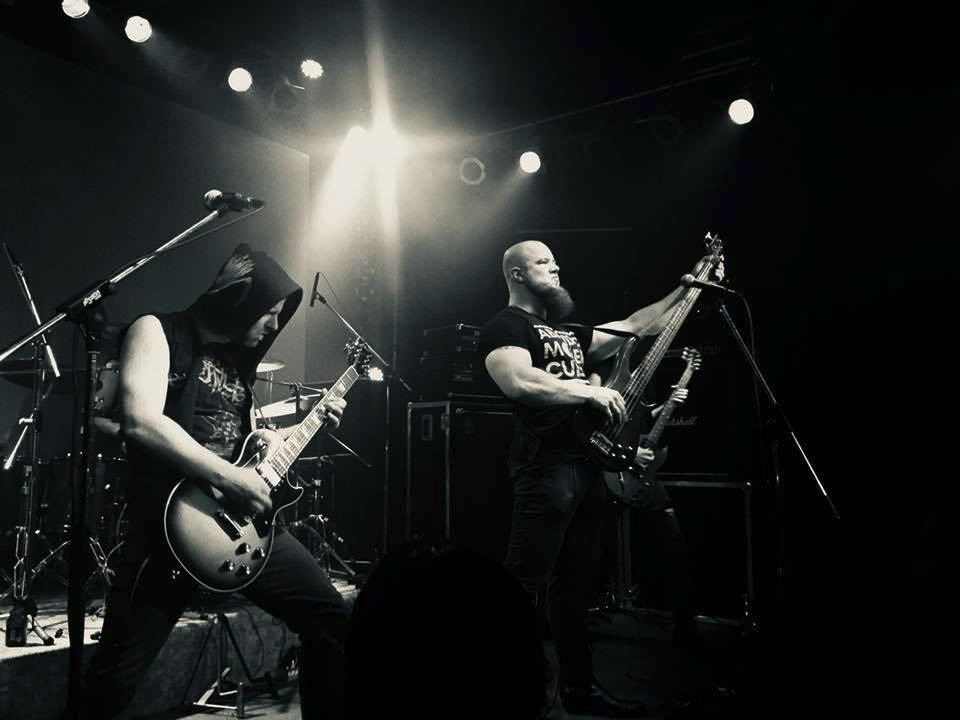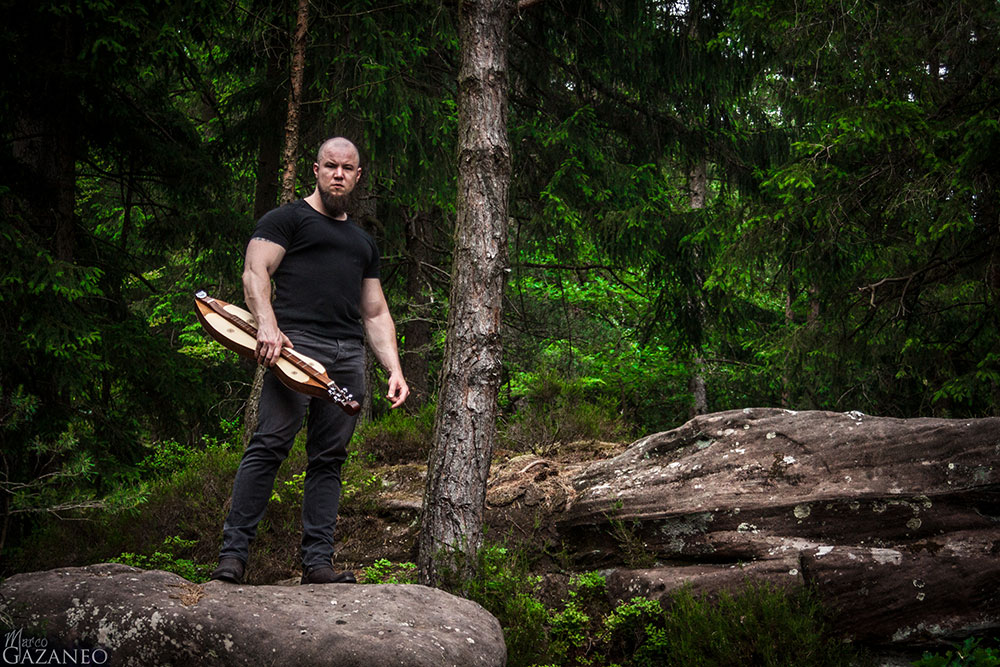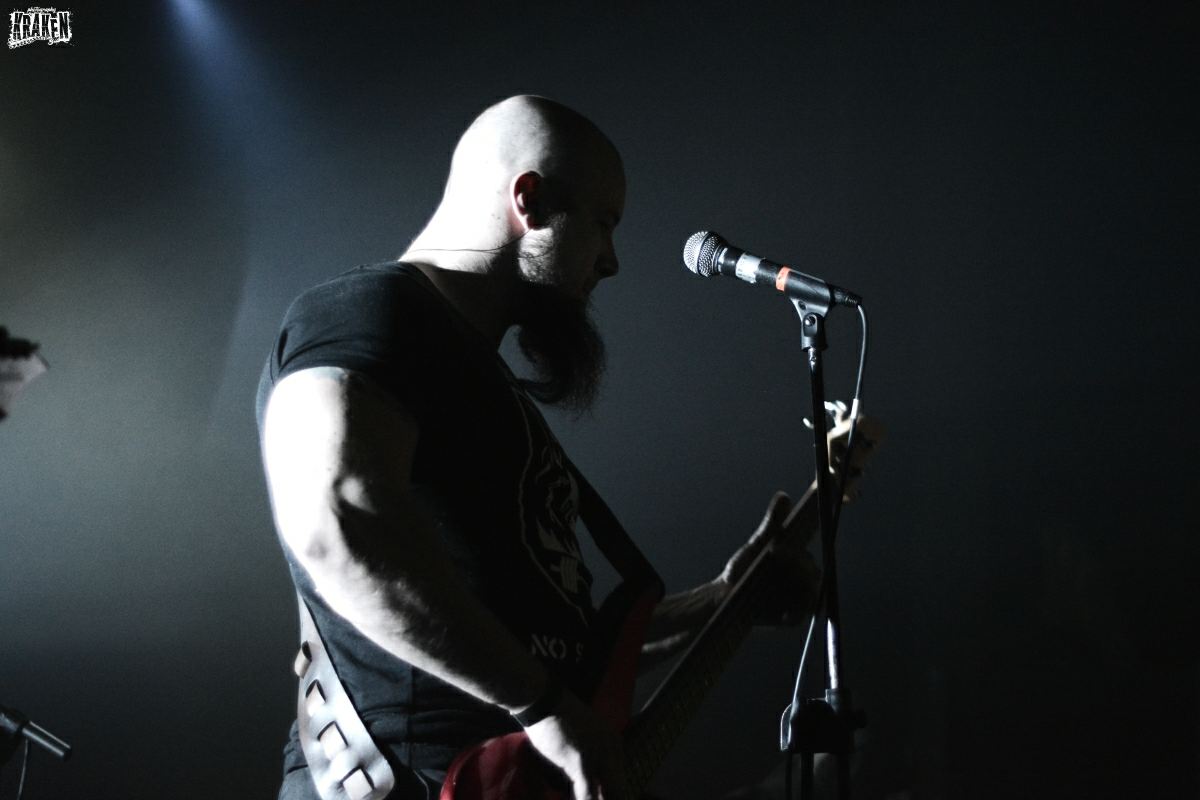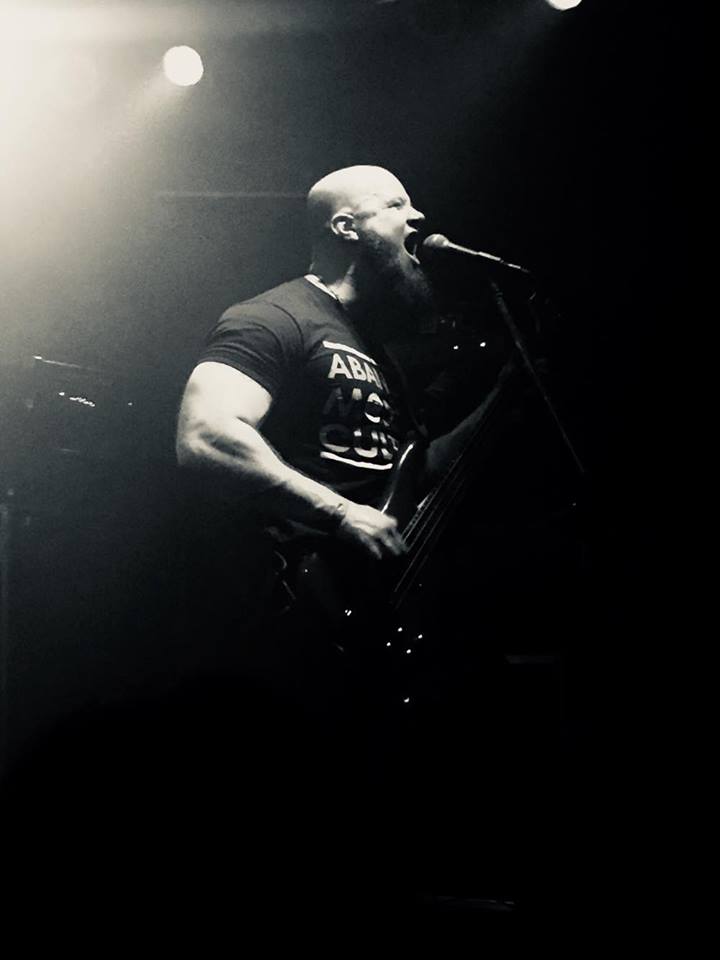Horn
2018-01-11
by Niklas Göransson
Horn is a folk-inspired black metal band from Germany. The linguistic musician behind the project discusses past and future times of strife and warfare, the spirit of masculinity, and how orderly punctuation paves the way for heavenly salvation.
– I suppose you could say that “Turm am Hang” (2017) is HORN’s most successful album to date. I believe this is mostly due to its enhanced production value, which is the result of my shift from home studio to professional recording facilities. I’m blessed to have at my side a highly talented sound technician who adds significant value, not only in his way of delivering top-notch audio quality but also in terms of patience – a highly necessary trait when collaborating with me – and an ability to contribute new ideas to my concepts. Secondly, my music has undergone a few structural changes since “Feldpost” (2015), switching from progressive and rather manifold eight-minute tracks to shorter pieces arranged after the classic verse-chorus form.
“Turm am Hang”, the latest album of German solo-project HORN, draws its main inspiration from a traditional 17th century piece called “Es ist ein Schnitter”.
– Being a huge fan of European folklore, I’ve been listening to various versions of this one for ages. I’m fascinated by the song’s morbid character – the placement of death above all, the Great Leveller who treats every man equal regardless of social stature or place in human hierarchies.
N performed his first and, until recently, only live show with HORN back in 2008. Ever since, he found himself grappling with the idea of forming a stable live ensemble – a notion which didn’t materialise until 2017.
– It took significant efforts to assemble and prepare all the material and then teach it to the others from scratch – around six or seven months of intense work. I was lucky to be able to gather a couple of talented friends from my region to assist me, so proximity is a big plus as we’re able to rehearse more or less spontaneously.

In October that year, HORN performed in a small German rural community called Weiher. The event was sold out weeks in advance, which must be considered a rather successful stage comeback.
– I guess some people had been waiting for all these years to find out how my material would hold up live. It was quite a night which sadly ended up somewhat botched from the start, as the venue was too packed for people to properly enjoy the bands. Most were still stuck at the entrance all through the opener’s gig. Secondly, there was a slight miscommunication between us and the sound guy, resulting in the crowd waiting for an encore in front of a fully lit stage for ten entire minutes… without us even having prepared one. That ended up a kind of unintentional middle finger towards the attendance. However, I believe the gig itself went quite well.
According to a Facebook post, N is currently working on implementing the Appalachian mountain dulcimer into future compositions. As per usual when it comes to eccentric instrumentation, I’m left wondering if its inclusion is mostly a bid for uniqueness or if it actually fills some manner of sonic functionality.
– With HORN being a highly folk-inspired project, I tend to seek out authentic folk elements to incorporate from time to time. I stumbled across the dulcimer a year ago when I was looking for a bowed Icelandic langspil, but found the former to be a more cost-efficient alternative. In my semi-deaf ears, the dulcimer’s sound resembles that of a lute, just a touch higher. It’s an interesting piece of equipment in that one usually employs only the frets on the two highest strings, which are arranged in a way that certain notes are left out. I know, there’s probably a specific term for this but I’m a simple man.
Following consultation with a scholarly acquaintance, I learned that this is called diatonic fretting.
– I’ve always found that limiting my options really helps me in getting ahead when it comes to writing music. If I had an entire orchestra with a hundred professionals ready at hand to play whatever I wrote, I wouldn’t know where to start and waste months on that. That said – the dulcimer did serve as a base for writing most of the guitar melodies for the upcoming “Retrograd” EP and was in itself incorporated into the song structures, so it actually does fill a sonic function.

Besides obscure instruments, N also has an unusual take on the interaction between lyrics and vocals – a stance which ties into his linguistic vocation.
– I earn my living as a translator of the Germanic languages. Being occupied with rendering words and improving their readability and overall flow all day long has definitely impacted the way I approach lyrical composition. There’s a strong focus on wording that sounds good when sung, whereas messages and content have a lesser role. If one wanted to bad-mouth this method, it might be said that I employ a kind of ’RAMMSTEIN-style’.
The German rock band use a lyrical strategy rooted in wordplay, ambiguous phrasings intended to cause confusion, and intonation pleasing to the ear.
– Even a German native listening to them will at times have those what-the-fuck moments. These days, it’s extraordinarily rare to come across highly successful pop bands who’re not serving an agreeable, round-edged and easily digestible message on a platter. RAMMSTEIN’s formula relies heavily on certain linguistic aspects of the German language, they’re the best of the best when it comes to ’words that sound cool’. I’m not ashamed to admit that I, from time to time, also incorporate wording that fits the overall sound structure rather than focusing on thematic sentiments.
My favourite example bespeaking the importance of orderly linguistics is what’s known as the Comma of Luke 24:43. The old Greek manuscript our Holy Bible was translated from featured no punctuation of any kind. As such, the intended use of commas for the passage in question has long been subject to theological quarrel. While perishing on the hill of Golgotha, our Lord and Saviour turns his head to address the likewise indisposed thief nailed to the neighbouring crucifix:
Truly I say to thee, this day thou shalt be with me in paradise.
The fact that a convicted criminal is being promised entry to Heaven on the very same day as his passing lends credibility to the Protestant stance of there being no Purgatorium. Often assigned incandescent qualities, purgatory is the Christian notion of an intermediate state between physical death and eternal afterlife – reserved for human souls who’ve been somewhat naughty but not quite enough to warrant perpetual damnation in Hell. Its transitory residents must be subjected to excruciating temporal purification before attaining sufficient holiness to be granted admission into the loving embrace of Heaven. No doubt, the cross-adorning convict would’ve been delighted to learn that he was being fast-tracked into the Garden of Eden. However, if we were to revisit the Redeemer’s remark with the comma placed two words later:
Truly I say to thee this day, thou shalt be with me in paradise.
Now we find ourselves in Catholic territory, since the Messiah merely states that they will one day meet in paradise – presumably following an unenviable sojourn through the fires of redemption. There used to be a similar in-between state called limbo, it was the end-station for babies who died before being baptised and thus found themselves in the unfortunate predicament of facing the Almighty’s judgement without having been absolved of the original sin. As part of the ongoing process of modernising the eternal decrees of God, the Vatican abolished limbo from Roman Catholic teaching in 2007.
– Quite the thought and an interesting point indeed. This would be a good example of unintended ambiguity. The Bible is not a work of art, it wasn’t written to encourage readers to formulate their own version of the truth. In the stated example, the author will probably not have realised that his words would cause confusion at some point in the future as far as semantics are concerned. Things are quite different when it comes to artistically-oriented work; as part of the aforementioned lyrical approach, I play with words in a way that intentionally leaves them open to interpretation. My style is mainly characterised by regionality, alliterations, ambiguity, as well as the play on languages and their idiosyncrasies.

I noticed the ’spirit of masculinity’ listed among the thematic concepts of “Turm am Hang”, a rather unusual topic in metal these days. As a fellow resident of a Western country, I’d have to consider it a veritable minefield to dabble in anything which could be tied to the dreaded ’toxic masculinity’.
– Being proud of or displaying any classic male characteristics at all has become an issue of political correctness, maleness in general is increasingly turning into a symbol of decades of oppression and evil. Males started wars which left millions to die – it was males who invented slavery and built the gas-guzzling muscle cars which bring down the health of our environment. All of this is true. But wasn’t it also males who created all those fancy smartphones people use to tweet out their disgust for us? Electricity? Houses? All the nice shit people rely upon and take for granted? Males did both good and bad things throughout history, there’s simply no lesson to be derived from this.
N describes himself as a traditionalist, which is precisely why his music is mainly concerned with historical settings.
– Times when classic masculine traits were looked upon more favourably; the age of wars, struggle and strife – when violence was a necessity to ensure survival. Although masculinity has lost much of its traditional meaning in modern society, there will come a day when its original value is reinstated. Conflict will return to our borders and shores sooner or later, it’s simply how this planet and its inhabitants work. Suddenly, you will find fearless protectors and aggressors to be in high demand. Contemporary Western generations have been born into peaceful times and are completely detached from all notions of violent hostilities. I am myself part of this brood and would consider myself far from a fearless protector, but I believe adopting such a mindset is a good start.
Warfare and its impact on the common man has been a frequently recurring topic in HORN. The previous album, “Feldpost”, was conceptually based on written war correspondence – an idea N had after studying letters that soldiers in World War I had written to their wives back home.
– Certain tracks on “Turm am Hang” also concern those who basically throw themselves into the Reaper’s scythe. This concept plays a big part in what the album is all about, the entire work is set in a baroque context – times when life was still a bit spicier, so to speak. The Thirty Years’ War is a central theme.
In humanity’s known history, the Thirty Years’ War boasts the impressive feat of being one of our most destructive conflicts – a three decade-long carnage contested largely in modern Germany and involving most great powers of the time, ultimately claiming the lives of an estimated eight million. Despite years of preceding skirmishes, the war is conventionally regarded to have begun in 1618 when the King of Bohemia, Ferdinand II, decided to enforce Roman Catholic absolutism throughout his domains. As the conflict escalated, the remnants of the Holy Roman Empire found itself battling clusters of Protestant towns supported by anti-Catholic nations such as Sweden and the United Netherlands – the latter having recently won independence after almost a century of Spanish rule. Spain had greater concerns at this point, finding itself dragged into a major conflict with France. The warring factions relied to a large extent on mercenary companies, many of which ended up not being paid and instead employed the ’wolf strategy’ that enjoyed great popularity in armed conflicts of the era; falling upon the defenceless countryside and ransacking everything from cities to isolated farms. After the Peace of Westphalia was sealed in 1648, the map of Europe had been completely re-drawn. This spelled the definite end to the ancient dream of a Roman Catholic empire, led in spirit by the pope and flesh by an emperor, instead making way for the structure of sovereign nations we know Europe as today.
– My historical themes usually come to me via music itself, in this case the “Landsknechtstrommel” – a 1963 recording by the German vocal ensemble Botho-Lucas-Chor. It’s a collection of wartime songs that reveal much of the agony, the joy, and attitudes of the German mercenary foot-soldiers known as lansquenets. It’s history as close you can partake in it since most songs were written at the time, undiluted by the scientific pretences one might encounter in history books.

Surveying N’s social media presence, one could easily get the impression that he entertains some manner of fitness routine.
– Correct. I fell in love with lifting heavy weights back in 2008 and have pursued it ever since. I can’t stress enough how much this sport has helped me through the years. The beauty of physical exercise is that it tends to improve multiple aspects of life simultaneously. Taking pride in the rewards of sweat, aching joints and broken bones equals confidence – something I imagine everyone could get on board with. Physical exercise is the key; if you’re feeling low and depleted, get the fuck out into the yard, grab the heaviest log you can find, lift it above your shoulders, scream at the top of your lungs and then get back in the house and eat a whole ox. Repeat each day.
N adds that apart from overcoming mental struggles, physical fitness will serve as a good antidote to the increasingly commonplace manner in which both him and I tend to spend our everyday lives.
– Sitting on your ass all day, typing away – to then remain immobile even after working hours, all the while stuffing greasy potato chips into your face, kills your testosterone and overall drive to get things done in life. A lack of achievements will in turn lead you to regarding yourself as a loser…and self-identifying as someone who fails, you’ll have a hard time getting anything done. It’s a vicious circle and exercise is the switch-blade to cut yourself loose.
He observes that since we have the same DNA as humans back in the Stone Age, there’s a case to be made that man wasn’t really born to sit in a chair all day long.
– With daily hunting trips boiled down to getting up once in a while to grab some snacks from vending machines down the hallway. No doubt, there’s definitely a certain necessity to compensate for the lack of what you’re programmed for – I experience certain amounts of unrest when I’m not able to work out. Getting home from a tough session at the gym will leave me with the ultimate bliss, hanging out on the couch doing nothing is so much more gratifying when you’ve worked your body into exhaustion beforehand. Physical fitness is something I’d consider one of the four cornerstones of my existence; strength athletics, linguistics, music, and socialising.



